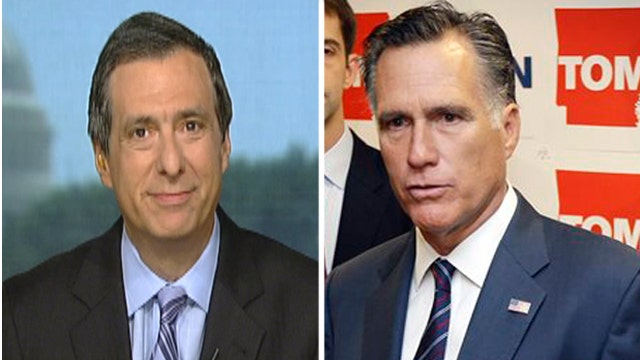Kurtz: Media clamor over potential Romney presidential run
'MediaBuzz' host says focus on another Romney presidential campaign is premature
Should Mitt Romney run for president one more time?
I’ve been dismissing the question as the product of underemployed political pundits trying to keep themselves amused. Romney has emphatically said no every time the question has come up.
Except that the other day he tacked on a phrase—“Circumstances can change”—that clearly cracked the door ajar. Although the rest of the comment, to radio host Hugh Hewitt, was: “But I’m not going to let my head go there.”
Okay, but what if we shifted the question from will he run—still unlikely, in my view—to what would happen if he did run?
The sudden nostalgia for Mitt is no mystery. With Barack Obama suffering through the worst stretch of his presidency, there’s a degree of buyer’s remorse among some voters. Some of what Romney said in 2012, such as Russia being our No. 1 geopolitical foe, looks very different in history’s rear-view mirror.
But the main momentum comes from a splintered GOP field. Chris Christie hasn’t recovered from his Bridgegate wounds. Jeb Bush remains ambivalent and remains more moderate than the activist Republican base. Scott Walker is in a tough reelection battle. Mike Huckabee isn’t sure he wants to leave Fox. Rand Paul and Ted Cruz have passionate followings, but the handicappers don’t see either man as a strong general-election candidate.
So with Republicans wondering who can possibly beat Hillary Clinton, Romney springs to mind as a known quantity—and someone who just lapped the field in a poll of Iowa GOP caucus-goers with 35 percent.
After a credible run in 2008, Romney was within striking distance of winning the presidency almost two years ago. Obama was unpopular, the economy was in the ditch, and the wealthy businessman was a credible alternative, especially after he clobbered the president in the first debate.
That was his moment. But he still couldn’t get it done. Is there reason to believe that Romney would fare better in a third try for the White House?
As The Hill put it: “Could Romney Really Run?”
Slate’s Reihan Salam tries to make the case. But first he concedes:
“The GOP won’t succeed until its candidates convince Americans that their policies will deliver upward mobility for all Americans, and not just the rich. Romney was pretty much the worst possible ambassador for a more populist conservatism, having made his fortune in the arcane world of financial engineering.”
Still, “when Romney was himself, as he was during his first debate with the president, he seemed solid and self-assured. If Romney did indeed decide to run again, he’d be wise to jettison his old playbook and to instead detail how he, as a practitioner of creative destruction and disruptive innovation and all the rest, can help make these powerful economic forces work for all Americans…
“He could build a new presidential campaign around the need to reform and renew America’s safety net, to make it fiscally sustainable while also making it more effective. Imagine if Romney, having been caricatured as a cat’s-paw of the Wall Street overclass, decided to rail against the outsize power of the megabanks and in favor of a more competitive and inclusive capitalism. If we let Romney be Romney, we might find the populist the party needs.”
So Salam is fine with Mitt running as long as it’s some other Mitt than we’ve seen before. Which doesn’t sound very realistic—and would revive the charges of flip-flopping that damaged him last time.
Salam says that according to Tagg Romney, the former governor’s son, Mitt didn’t even want to run in 2012 but felt he had to step into a weak field. The piece also points to another Republican who won the presidency on his third try: Ronald Reagan. Romney would be the same age, 69.
I’ll refrain from the “he’s no Ronald Reagan” joke, but what hurt Romney more than anything in 2012 is that he’s not a natural politician.
From “binders full of women” to “self-deportation,” from “I like being able to fire people” to disparaging the “47 percent,” Romney kept stepping in it. He never figured out how to respond to the attacks on his Bain Capital background.
Marc Thiessen focuses on those weaknesses in his Washington Post column:
“Let’s not forget that Romney was also a horrible presidential candidate. He faced one of the most vulnerable incumbents in modern times — and found a way to lose.
“He made huge tactical errors — from not responding to Obama’s devastating personal attacks all summer to letting Obama harness the power of data like a Bain Capital numbers-cruncher while Romney’s data-mining effort crashed and burned like, well, Solyndra.
“But what ultimately cost Romney the election was a lack of vision — a flaw that is uncorrectable. Romney had changed positions so often over his career that by 2012 no one knew what he really believed.”
I watched Romney up close on several occasions during the campaign, and while he is a very nice man, he is just awkward around large groups of people. He never seemed comfortable talking about himself. And modesty is not a virtue in a presidential campaign.
It’s not impossible that Romney could run and win. Maybe he will have learned from experience and the third time’s a charm. But Romney is savvy enough to say that being unattainable makes you more attractive.
The more likely outcome is that a groundswell of support for another Republican candidate or two will keep Romney on the sidelines. But politics is a strange business, and as Mitt says, circumstances can change.













































